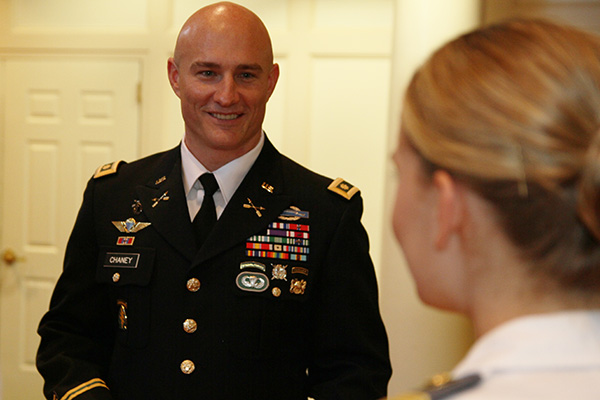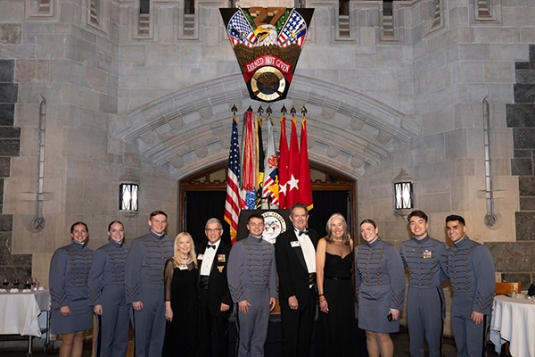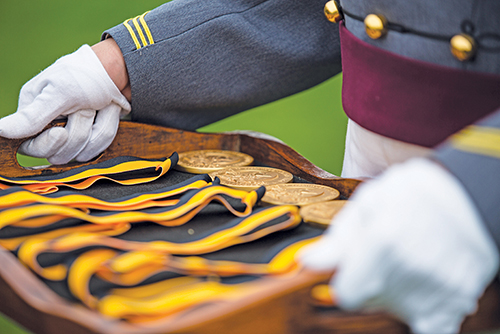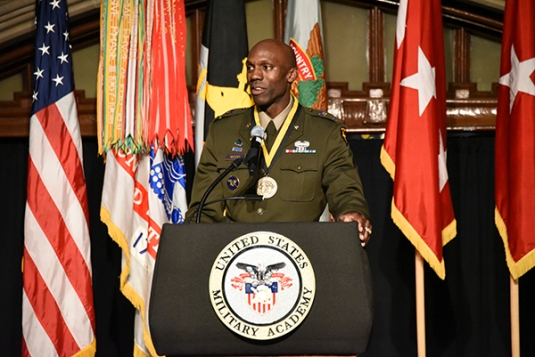West Point was a somewhat different place when Major Matthew Chaney ’01 was a cadet. Chaney is the 2016 recipient of the Alexander R. Nininger Award for Valor at Arms, and he returned to the Academy on September 22, 2016 to address the Corps of Cadets as this year’s representative of all West Point-commissioned officers who have heroically led soldiers in battle. “We weren’t an Army in conflict back then,” said Chaney, a member of the last class to graduate before the upheaval that followed with 9/11, in a pre-speech interview. “We might have heard from a Vietnam-era officer or perhaps one who served in the Gulf War, but no one was focused on picking up every element of combat knowledge.” Given the actions for which Chaney was being recognized and the conditions of the Army upon their graduation, current cadets were soaking up every word Chaney uttered at the Nininger ceremony in Washington Hall.
On September 10, 2007, then-Captain Chaney was serving as detachment commander for Special Forces Operational Detachment 083 of the 10th Special Forces Group (Airborne) during Operation Iraqi Freedom. He had been in country since May of that year, and since March the team he took over had been conducting missions on high-value Islamic State of Iraq (ISI, an arm of al-Qaeda at the time) targets. “In most cases, our element of surprise was exceptionally good, catching most targets in bed,” Chaney told an interviewer, noting that his “pretty senior team” had conducted more than 50 such missions before the night of September 10.
On that night, Chaney led nearly two dozen U.S. Green Berets and Iraqi National Police on a dead-of-night raid of a rural farming complex on the outskirts of Samarra, Iraq to bring down Abu Obaeideah, an ISI kingpin who was responsible for weapons smuggling, kidnapping, torture, and murder. The plan was to dismount behind a hill 500 meters from the target, set up support positions, and move on foot towards the farmhouse containing the target; however, standing water prevented their Black Hawk from landing at its primary site. Chaney, two Green Berets, and the Iraqi police were forced to dismount only 25 meters from the target house without the benefit of cover. Worse, brown-out conditions from their Black Hawk forced a second helicopter carrying the other half of the assault team to land a considerable distance away. Immediately, Chaney and his team began taking on fire from doorways and windows from an insurgent force that significantly outnumbered them. Without the benefit of night-vision goggles, the Iraqi police became disoriented and fled. Chaney told the Corps assembled in the Mess Hall, “With no cover and too close for air support, our options were to turn and run or rapidly close with our enemy—no communication was needed—speed and violence of action would be our security.”
Chaney and the two Green Berets maneuvered quickly to the primary target building, engaging targets as they moved. Using a grenade as cover, they burst through the door. In the firefight that ensued, they killed the high-value target, but they also got shot. Then, an enemy grenade or suicide vest detonated, blowing Chaney and a fellow Green Beret five meters outside the building. Unable to move his legs, Chaney dragged himself to a dead ISI insurgent for cover. With a gunshot to his hip and with a broken tailbone and a concussion from the blast, Chaney was still able to take down an insurgent who was firing at him from another building’s open doorway. Then, noticing that a member of his team was bleeding from the stomach (gunshot) and neck (shrapnel), he threw an IR chem-light behind him to signal to the team’s medic, who was sprinting in full kit across 500 meters of plowed field along with the rest of the detachment from the second Black Hawk. Chaney’s second team member emerged from the target building with a wound in his stomach and “his left thumb held on only by his glove,” and the two of them engaged and killed more attackers.
After 15 minutes of intimate fighting, the compound was secured. Chaney and his team were credited with killing 11 ISI fighters, including the high-value target. An estimated 18 fighters were on the objective that night. They also rescued two Iraqi kidnap victims. For his gallantry and leadership in action against the enemy that night, Chaney was awarded a Silver Star and the Purple Heart for his wounds received in combat.
“Looking back on that night, I realized that we were all trained to size up a fluid situation and make the best decision available,” Chaney told the cadets. “In my case, this began on the rugby fields and in the training areas and classrooms of West Point.” For the remainder of his speech, Chaney stressed to the cadets the concept of mental toughness, which he believes West Point incrementally instills in cadets every day, preparing them for the stresses of life as well as the Army. “Every challenge you overcome or shake off—such as the humbling ‘high zero’ of gymnastics, which I once received—is building your mental toughness,” Chaney said. “Every time you ignore weariness, pain, or other temptations, you become more prepared.”
Cadets, such as Amanda Blanco ’17, took Chaney’s message to heart. “We get so caught up in the day-to-day life here—academics, sports, duties—but listening to Major Chaney made me realize that we are doing all these seemingly tedious things for a bigger cause.”
Presented by the West Point Association of Graduates (WPAOG) and endowed by E. Douglas Kenna ’45 and his wife Jean, the Nininger Award is named for Second Lieutenant Alexander R. Nininger ’41, who fought the enemy to his death during the Battle of Bataan in January 1942 and posthumously received World War II’s first Medal of Honor. In addition to recognizing the recipient for his or her bravery as an individual, WPAOG regards the recipient as a given year’s representative for all West Point-commissioned officers who have heroically led soldiers in combat.
“Throughout its history, West Point has produced leaders of character who have served our nation with valor and distinction,” said the Superintendent, Lieutenant General Robert Caslen ’75, in his remarks opening the ceremony. “Major Matt Chaney is one such leader of character, who has displayed extraordinary valor and heroism in combat in the spirit of Lieutenant Nininger, and who truly embodies the West Point values of Duty, Honor, County, as well as the values of our Army.”
Announcement
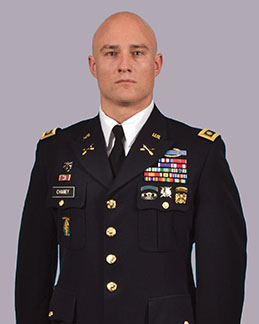
MAJ Matt Chaney was commissioned as a Second Lieutenant in the Corps of Engineers from the United States Military Academy in 2001 with a Bachelor of Science in Economics. He served as the Executive Officer for the 7th Engineer Dive Detachment and Assistant S-3 in the 29th Engineer Battalion at Fort Shafter, HI. After completing the Special Forces Qualification Course in 2007, MAJ Chaney was assigned to Bravo Company, 3rd Battalion, 10th Special Forces Group (Airborne) at Fort Carson, CO as the Detachment Commander for Special Forces Operational Detachment-Alpha (SFOD-A) 083, B Company, 3rd Battalion, 10th Special Forces Group (Airborne), later designated SFOD-A 0335. During this time he conducted two combat deployments to Iraq and one operational deployment to Azerbaijan. In 2011, MAJ Chaney was awarded the General Wayne A Downing Fellowship and attended the University of Chicago and the University of Tel Aviv, earning a Master’s Degree in Public Policy with an emphasis on counterterrorism and international security. MAJ Chaney then returned to 10th Special Forces Group (Airborne) from 2013-2016 where he commanded A Company, 2nd Battalion, served as the 2nd Battalion S-3, and Group S-3. During these years he deployed forces across West Africa and led an interagency team to counter violent extremist organizations within the USAFRICOM Area of Responsibility.
MAJ Chaney is currently assigned as the Executive Officer to the Commanding General of 1st Special Forces Command (Airborne) and is deployed in this role in support of Special Operations Joint Task Force-Operation INHERENT RESOLVE.
MAJ Chaney’s military schooling includes the Engineer Officer Basic Course, Dive Officer Course, Salvage Dive Officer Course, Infantry Officer Advanced Course, Special Forces Qualification Course, SERE School, Combat Dive Qualification Course, Command and General Staff College-Intermediate Level Education, and Airborne, Jumpmaster, and Ranger Schools.
MAJ Chaney’s awards and decorations include the Silver Star, Purple Heart, Meritorious Service Medal, Bronze Star with one Oak Leaf Cluster, Joint Service Commendation Medal, Army Commendation Medal, Army Achievement Medal with two Oak Leaf Clusters, National Defense Service Medal, Iraq Campaign Medal, Global War on Terrorism Service Medal, Combat Infantryman’s Badge, Special Forces Tab, Ranger Tab, Army Parachutist Badge, Naval Dive Officer Insignia, and Combat Diver Badge.
Speech
20 SEP 2016

General Caslen, Mr. Browne, distinguished guests, and the Corps of Cadets, thank you very much for this honor. I am truly humbled to represent the many West Point graduates who have led America’s Soldiers in combat.
As you all can imagine, preparing for tonight caused me to reflect on my days as a cadet. Back then I kept a note on my desk. The note read “It’s not just about me.” ….That thought—”It’s not just about me”– often reminded me that I had volunteered, along with my classmates, to be placed into this crucible that is West Point… to prepare for something greater than our own individual ambitions.
As a cadet, I kept myself going, knowing that each challenge we faced, whether it was preparing for a Saturday morning physics test … or bouncing back from a “High-Zero” in gymnastics, each made us incrementally stronger– stronger for each other and stronger our future Soldiers.
This evening—and I promise I won’t take your entire evening—I want to share with you my experience in Iraq and how it relates to what you’re doing now. But first, I’d like to recognize the families who bear the burden of having a son or daughter…, husband or wife…, father or mother deployed. They are in the fight too… And they give us the strength to serve our great country.
Mom… Dad, I know it weighs heavily on you each time I deploy. Thank you for your courage, prayers, and constant support.
And to my wonderful wife Sonya, who learned to clean out gunshot wounds so I could come home from the hospital early while she took care of our newborn son; who supported my deploying again only 7 months later, and who is now raising our three boys…often doing so alone.
Sonya, you are an American Bad Ass—in the best sense of the phrase—a true patriot and my rock…. To my sons, Grayson, Colton, and Myles, I am so proud of the men you are growing into.
Sharing my team’s story this evening is meant as a tribute to my fellow officers, classmates, NCOs and Soldiers. They have sacrificed deeply through many years of combat. I owe my life to some of them. Some… are no longer with us, but they are always with us in spirit.
In September of 2007, my Special Forces Detachment was operating in Samara, Iraq. There I-S-I, the precursor to ISIS, had set out to inflame Sunni-Shia tensions. I-S-I was using murder, kidnappings, torture, and all variants of the worst evil imaginable to terrorize the Iraqi people. However, tribal leaders began to turn against I-S-I. My detachment leveraged this new sentiment to broker a cooperative agreement with Iraqi tribal leaders…formerly hostile to our coalition. Strategically, this was a big deal. It marked a turning point in the fight against I-S-I. One result of this new alliance was that we received detailed intelligence on a senior I-S-I leader. We were told he was operating out of a small, remote farm, and ISR indicated he was guarded by only 2 or 3 fighters. In response, we planned an air assault to insert my team of nine Green Berets, an Air Force JTAC…, and about a dozen Iraqi police. Our plan was to dismount behind a hill offset from the farm…, set in our support position…, and move on foot toward the objective.
That night…it was pitch black. As our two Black Hawks buffeted through the sky, I had a strange sense of calm. With the doors open, I watched through my night vision as small cooking fires passed below us. I looked across the aircraft at Master Sergeant Jarion Halbisongibbs. He was bobbing his head as if still listening to Kidd Rock in our team room. His smirk told me he was ready. Master Sergeant Mike Lindsay, my second assault cell leader, sat on the other side. Iraqi police were strapped into seats between us. And the remainder of our team was in the second Blackhawk, trailing behind.
30 minutes into the flight, the pilot reported that he could not land on the Primary Landing site. Then, as we set course for the alternate LZ, the farm buildings suddenly popped into view. The pilot quickly banked the bird and set us down only 25 meters from the target house. As the Blackhawk lifted off, we started taking enemy fire from close range. Our Iraqi partners, without the advantage of night vision…initially fled. We saw that our second bird… had continued to the alternate LZ… about 500 meters away. Enemy fire was coming at us from doorways and windows. And we realized… we were clearly outnumbered. With no cover…and too close to the enemy for air support, we had two options: We could turn and run—leaving our helicopters, teammates, and ourselves exposed to machine gun fire and RPGs, or… we could rapidly close with the enemy.
Jar, Mike and I made the same decision—no communication was needed—speed and violence of action would be our security. We maneuvered quickly across the open space to the primary target building, engaging enemy fighters as we moved. The three of us formed a stack on a first doorway. Jar did the smoothest prep of a grenade I’d ever seen, and then tossed it through the doorway. After the grenade exploded, the three of us flowed into the room—Jar, then me, then Mike, engaging fighters as we entered. As we crossed the threshold, what turned out to be the ISI leader, squeezed off a burst of 7.62 from the corner of the dust-clouded room…, striking each of us below our body armor, just as Mike shot him.
I began to fall to the ground, but I was suddenly propelled from the building…, landing nearly 5 meters outside. Now entangled with Mike, I realized an enemy grenade or suicide vest had blown us out the door. Unable to move my legs, but still under fire, I flipped my weapon to safe, rolled off Mike, adjusted my night vision and dragged myself a few feet to use a dead fighter for cover. I began returning fire again. Mike, with a gunshot wound to his stomach and shrapnel through his neck, transitioned to his pistol as he applied pressure with his free hand to the wound in his neck. I threw an I-R chem-light behind him—a signal he should be treated first. Jarion, who had been blown into the corner of the room, emerged with his left thumb held on only by his glove. He stepped over me to continue the assault, but was shot again in the stomach. Without stumbling… he returned fire and killed his attacker. Wounded and now in the open again, the three of us scrambled to defend each other.
Meanwhile, running in full kit across a plowed field, our teammates—Tony, Chad, Tim, and Matt—laid down suppressive fire along with Terry & Carl who provided sniper fire from a Blackhawk overhead. As they secured the remainder of the objective, our medic, Sean, bounced between the three of us with incredible skill and calm, and with complete disregard for his own safety.
After less than 15 minutes of fighting, an estimated 18 enemy fighters were eliminated, including our primary target…, and we rescued 2 Iraqi kidnap victims. For their valorous actions, Master Sergeant Jarion Halbisongibbs was awarded the Distinguished Service Cross and Master Sergeant Mike Lindsay received the Silver Star. SGM Sean Howey, our medic, received the Army Commendation Medal for Valor.
Looking back on that night, I realized that we were all trained to size up a fluid situation and make the best decision available. We were conditioned to do so fast, with little communication and complete focus on the mission. Our individual and collective preparation to that point in our careers had developed in us a MENTAL TOUGHNES. In my case, this preparation began on the Army Rugby fields, in the Patrols at Camp Buckner and in the classrooms here at West Point. We had an edge over our enemy that went beyond firepower and mobility. That edge enabled us to win against an entrenched and numerically-superior force.
You know…I think of this Mental Toughness as a learned ability to override natural human responses at will. For example, fleeing or cowering from gunfire is a natural human response; choosing to move toward the flash of AK-47s is not. Ignoring the pump of blood leaving your body is unnatural; as is stepping out into gunfire to protect your teammates.
Mental Toughness is developed each time you choose to override your natural human response to stress. The West Point experience—chock full of stress—is incrementally building this in you. Every time you choose to power through your weariness, pain, or other temptations, you become a little more resilient.
Now…I know that you hear something like this every day; however, you should be confident that what you are experiencing here at West Point is making you stronger. Even…the humbling “High Zero” of gymnastics. By the way, I think it was Dr. Tendy that gave me that “High Zero”—that still hurts—I tried so hard on that cartwheel.
Thank you for your attention this evening. I look forward to serving with you in the years ahead.
In closing, I’d like to thank the Association of Graduates, the Kenna Family and everyone here at West Point for the courtesies you extended me and my family.
De Oppresso Libre!
BEAT NAVY!

